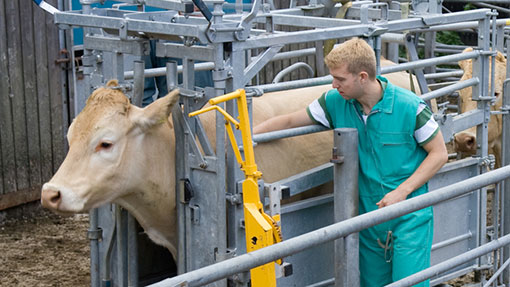Experts plan rapid test for bovine TB

Scientists are developing a portable testing device they say will detect bovine tuberculosis in cattle in just a matter of minutes.
Researchers at Nottingham Trent University say the development means quicker testing could be taken to limit the spread of the disease – one of the biggest challenges facing the cattle sector.
Currently it can take up to a week to identify bovine TB, following two separate skin tests by a veterinary physician and further analysis in a laboratory.
But the new £1.1m study could give vets an almost instant diagnosis from a simple blood test carried out using a device the size of a smartphone when they visit farms.
This means, if cattle are infected, crucial decisions to vaccinate, isolate or cull a herd could be made early before the disease spreads or worsens.
More on bovine TB and the badger cull
The device could also be used to provide important reassurance to farmers about the health of their cattle, before they sell for milk or beef.
In addition, reducing the levels of bovine tuberculosis in the environment could help to resolve TB issues in badger populations, potentially reducing the need for culling, the scientists say.
Professor Graham Ball said: “The current process for testing cattle is slow and expensive, but this technology would allow us to address each of those problems.
“Bovine tuberculosis is a growing challenge. The disease can spread quickly and easily in the time it currently takes to get a definitive result.
Professor Ball added: “Our system would provide major benefits to farmers in terms of herd management and isolation of bovine TB cases.
“And the economic benefits to the country, specifically through the reduction of testing, analysis and compensation costs are potentially huge.”
The three-year study is a collaboration between CompandDX Ltd (NTU), Public Health England, Sapient Sensors and the Centre for Process Innovation.
It is being co-funded by the UK’s innovation agency, the Technology Strategy Board.
Scientists hope to use “biological markers” – or molecules – in the blood, which indicate the presence of bovine TB and help them spot the disease from a blood test.
As well as providing a rapid, accurate diagnosis, researchers say the new system would be more cost effective than the current system – with no costly repeat testing.
It would also involve one visit from a vet, with the potential to reduce the amount paid out in compensation to farmers by correctly identifying infected cattle.
From January to August last year more than 22,000 cattle were slaughtered because of bovine TB, and the disease has cost the UK taxpayer £500m over the last 10 years.
